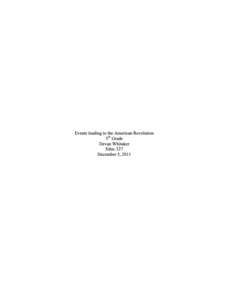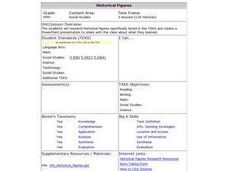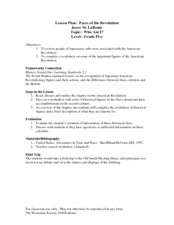Manchester University
Events leading to the American Revolution
The Stamp Act, Paul Revere's ride, and the Boston Tea Party pushed American colonists to the tipping point that led to the American Revolution. Fifth graders research the key figures of the war, study the Declaration of Independence, and...
Constitutional Rights Foundation
The Troubled Elections of 1796 and 1800
Congress does more than create new laws. Political scientists delve into the elections of 1796 and 1800 to understand how political parties, the Electoral College, and personal agendas affected the election process. The resource also...
Museum of the American Revolution
Through Their Eyes: Major Causes and Events of the American Revolution
Looking for an efficient way to explore the causes and results of the American Revolution? The American Revolution Museum offers a seven-lesson series to hit the highlights of this turning point, using primary sources and activities such...
Simon & Schuster
A Teacher's Guide to 1776 by David McCullough
David McCullough's Pulitzer Prize-winning novel, 1776, is the focus of a 28-page teacher's guide. The guide includes pre-reading questions, background information about key British and American figures, and chapter-by-chapter lessons.
K20 LEARN
Analyzing Early American Figures: Analyzing History
Who were they? High school freshmen brush up on their research skills by investigating an important person in American history. They select a name, fill out a KWHL chart, and research why their person is important. Scholars then complete...
Curated OER
Technology: Historic Figures
Fifth graders research historical figures and create Powerpoint presentations about them. They present their completed projects to the class. Students gfenerate one question about their figure which is included on a quiz.
Curated OER
The Constitution: Drafting a More Perfect Union
Learners analyze the U.S. Constitution. In this U.S. History lesson, students explore the purpose of the Constitution, as well as who was involved in its creation.
Curated OER
Scavenger Hunt
Students participate in a scavenger hunt to gather information on their governmental officials. Using the internet, they identify and discuss the various political boundaries to determine who their representative is. They complete a...
Curated OER
A Quick Look at the Makah Whaling Issue
Students discuss the idea of values and how they are different for different people and cultures. Using the Internet, they read about the Makah whaling issue affecting the Pacific Northwest. They discuss who has the right and authority...
Curated OER
Signature History
Students review the meaning and application of primary and secondary sources in research. They determine how researchers locate primary source documents before looking at signatures as a validating factor on many primary sources....
Curated OER
Science: It's a Nutty World!
Fourth graders conduct Internet research to explore various peanut-related topics. Among topics they investigate are: agriculture, scientific uses, and the research of George Washington Carver. As a technology component, 4th graders...
Curated OER
History is a Series of Decisions
Students examine cause and effect. In this American Revolution lesson, students analyze primary source documents regarding the Stamp Act, the Boston Massacre, and George Washington. Students imagine if the events had unfolded differently...
Carolina K-12
Are You a Democrat or a Republican? Are You Really?
Have new or soon-to-be voters examine different political parties and their platforms as they figure out which one aligns most with their beliefs. After taking a few online quizzes, students split into pairs to discuss and then in larger...
Curated OER
First Grade American Civilization: February
First graders examine and discuss the Boston Tea Party, Paul Revere, Redcoats, Thomas Jefferson and the Declaration of Independence. They conduct an experiment done by Benjamin Franklin, solve a word puzzle written in code by Ben...
Curated OER
Faces of the Revolution
Fifth graders investigate the important figures of the American Revolution. In this American Revolution activity, 5th graders outline the important events of the war and complete a worksheet.
Curated OER
Women Following Washington's Army
Students study about the role of women in modern early warefare. They participate in a teacher-led discussion and work individually or in groups to complete a worksheet and discuss their ideas.
Curated OER
The Kanaka Village at Fort Vancouver: Crossroads of the Columbia River
Young scholars study the interaction between Native American and European cultures in the Pacific Northwest in the 1800s. They focus their study on the Hudson's Bay Company and Fort Vancouver.
Curated OER
Past and Present
Students identify George Washington on the obverse of the quarter and read about George Washingington. They compare Washington to the current president and practice distinguishing between events in the past and the present.
Curated OER
Assessing the Character of the Colonies: Rules of Civility and Decent Behavior
Students read a primary source document about the rules of civility and behavior in the presence of company. Using the text, they make assumptions about how life was like in the colonies. They compare and contrast the culture of the...
Curated OER
Presidents Day
In this reading comprehension activity, students read facts about George Washington, Abraham Lincoln, and Presidents Day. Students answer three multiple choice comprehension questions.
Curated OER
Early Presidents and Politics
Students investigate early presidents of the United States. Students complete a series of lessons in which they research the contributions and political climate during the terms of U.S. presidents from George Washington to Andrew Jackson.
Curated OER
North and South
Young scholars study the Civil War and the changes it brought to our country. They examine some of Robert E. Lee's accomplishments and the contributions he made as president to Washington and Lee University. They make a map showing which...
Curated OER
Wow! Water, Trees, Fish!
Students observe the wildlife shown on the Washington state quarter and discuss what the world would be like if there were no natural resources. They complete a worksheet of drawings that depict the world without trees, water or fish.
Curated OER
Scientists and Inventors
Students explore human discovery by reading historical stories in class. In this inventors lesson, students define the terms scientist, invention, inventor and discovery before discussing the many differences between them. Students read...
Other popular searches
- George Washington
- George Washington Carver
- Carver George Washington
- George Washington Lesson
- George Washington Quarter
- President George Washington
- George Washington Presidency
- Art George Washington
- George Washington Biography
- George Washington Harris
- George Washington Worksheets
- Facts About George Washington

























